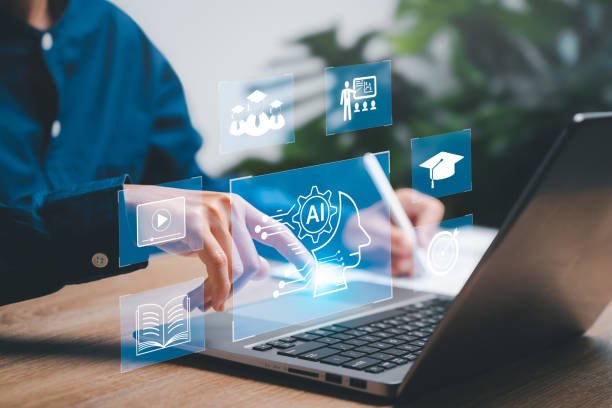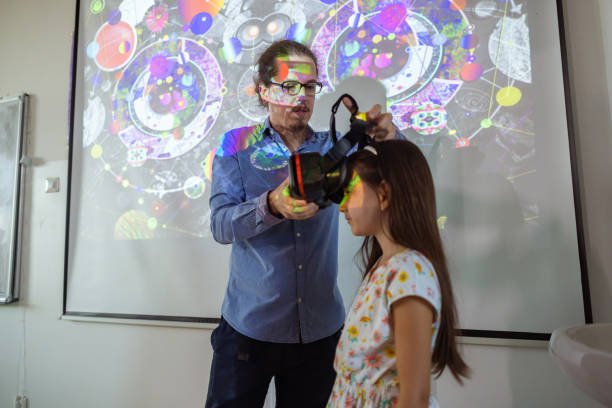Why AI in Schools Is the Future
Artificial Intelligence (AI) is transforming industries worldwide, and now it is making its way into school curriculums. Governments and educational institutions are realizing the importance of AI education for students. This shift aims to prepare the next generation for a tech-driven future where AI skills will be essential.

The Growing Demand for AI Education
1. Preparing Students for Future Jobs
- AI is becoming a key part of industries like healthcare, finance, and entertainment.
- Learning AI early can help students secure future job opportunities.
- Companies are looking for employees with AI knowledge, making it a crucial skill.
2. Enhancing Problem-Solving and Critical Thinking
- AI education encourages students to think logically and solve complex problems.
- Coding and AI-related activities enhance creativity and analytical thinking.
- Students learn how to break down problems and create AI-driven solutions.
3. Increasing Digital Literacy
- AI tools like chatbots, virtual assistants, and machine learning are becoming common.
- Teaching AI helps students understand technology beyond just using it.
- AI literacy ensures students can interact with digital systems effectively.

How Schools Are Integrating AI Education
1. Including AI in the Curriculum
- Many schools are adding AI subjects as part of their computer science courses.
- AI basics are being taught at primary levels, while advanced topics are introduced in high school.
- Universities are also offering AI-related degree programs and specializations.
2. Hands-on AI Projects and Experiments
- Schools are using AI-powered tools for interactive learning.
- Students are building simple AI models, chatbots, and image recognition systems.
- AI-based competitions and hackathons are encouraging innovation among students.
3. AI-Powered Personalized Learning
- AI is being used to create personalized learning experiences for students.
- AI tutors and smart learning platforms help students learn at their own pace.
- Teachers are using AI to analyze student progress and provide targeted support.

Challenges in Implementing AI Education
1. Lack of Trained AI Teachers
- Many educators are unfamiliar with AI and need training.
- Governments and institutions must invest in teacher development programs.
2. High Costs of AI Infrastructure
- AI tools and software can be expensive for schools.
- Funding and partnerships with tech companies can help bridge the gap.
3. Ethical Concerns and Data Privacy
- AI systems collect large amounts of student data.
- Schools must ensure AI is used responsibly without compromising privacy.
The Global Impact of AI in Education
1. AI in Education Across Different Countries
- United States: AI-based learning platforms like Khan Academy are widely used.
- China: The government has introduced AI education policies nationwide.
- India: Schools are integrating AI as part of the digital learning revolution.
- Europe: Many universities are offering AI specializations and research programs.
2. Role of Governments and Private Companies
- Governments are investing in AI education policies and funding research.
- Tech giants like Google, Microsoft, and IBM are providing AI-based learning tools.
- Public-private partnerships are helping integrate AI into mainstream education.
The Role of AI in Special Education
1. AI Helping Students with Disabilities
- AI-powered assistive technologies are making education more accessible.
- Speech recognition and text-to-speech tools help students with dyslexia.
- AI-driven sign language interpreters support students with hearing impairments.
2. Personalized Learning for Special Needs Students
- AI adapts lessons based on each student’s unique learning pace.
- Smart tutors identify areas where students struggle and provide customized support.
- AI-enabled classroom tools offer individualized attention without overwhelming teachers.
AI and Teacher Support
1. Reducing Teacher Workload
- AI automates administrative tasks like grading and attendance tracking.
- Virtual assistants help teachers manage lesson plans and assignments.
- AI chatbots provide instant responses to student inquiries, saving teacher time.
2. Enhancing Teaching Methods
- AI-driven analytics help teachers identify learning gaps in students.
- Virtual reality (VR) and AI simulations offer immersive learning experiences.
- AI can provide insights into student engagement and performance trends.

Ethical Considerations in AI Education
1. Bias in AI Algorithms
- AI systems can inherit biases from data used for training.
- Schools must ensure AI models promote diversity and fairness.
- Ethical AI frameworks should be part of AI curriculum development.
2. Responsible AI Usage
- AI should be used to enhance, not replace, human interaction in education.
- Teachers and students must be educated on ethical AI practices.
- Governments should regulate AI use to prevent misuse in schools.
The Future of AI in Schools
- AI education will continue to expand in the coming years.
- More AI-powered tools will be developed to enhance learning.
- Schools that embrace AI early will give students a competitive advantage.
- AI will play a crucial role in bridging the digital divide by providing equal learning opportunities.
Conclusion: AI Education Is a Necessity
Artificial intelligence is no longer just a futuristic concept; it is a necessity for today’s students. Schools must adapt and integrate AI into their curriculum to prepare students for the digital world. With the right investment and strategies, AI education will shape a smarter, more technologically advanced generation.
Universal Pre-K: Game-Changer or Waste? Heated Debate Sparks Nationwide!






